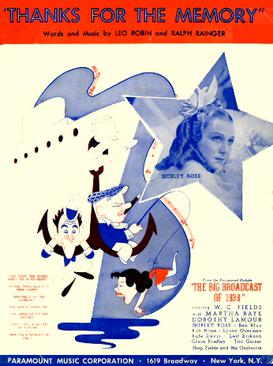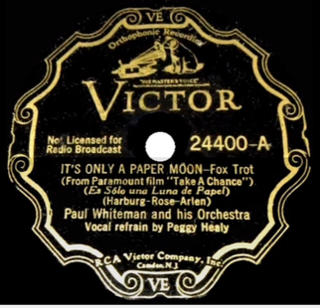Related Research Articles
Gordon Hill Jenkins was an American arranger, composer, and pianist who was influential in popular music in the 1940s and 1950s. Jenkins worked with The Andrews Sisters, Johnny Cash, The Weavers, Frank Sinatra, Louis Armstrong, Judy Garland, Nat King Cole, Billie Holiday, Harry Nilsson, Peggy Lee and Ella Fitzgerald.
"Begin the Beguine" is a popular song written by Cole Porter. Porter composed the song during a 1935 Pacific cruise aboard the Cunard ocean liner Franconia from Kalabahi, Indonesia, to Fiji. In October 1935, it was introduced by June Knight in the Broadway musical Jubilee, produced at the Imperial Theatre in New York City.

"Let's Do It, Let's Fall in Love" is a popular song written in 1928 by Cole Porter. It was introduced in Porter's first Broadway success, the musical Paris (1928) by French chanteuse Irène Bordoni, for whom Porter had written the musical as a starring vehicle.

The Best Is Yet to Come is a 1982 studio album by the American jazz singer Ella Fitzgerald, accompanied by a studio orchestra arranged and conducted by Nelson Riddle.
"In the Wee Small Hours of the Morning" is a 1955 popular song composed by David Mann, with lyrics by Bob Hilliard. It was introduced as the title track of Frank Sinatra's 1955 album In the Wee Small Hours.

Ella Fitzgerald Sings the Johnny Mercer Song Book is a 1964 studio album by the American jazz singer Ella Fitzgerald, with the Nelson Riddle Orchestra, focusing on the songs of Johnny Mercer. It was recorded in Los Angeles, California. This is Fitzgerald's fifth and final collaboration with Riddle during her years on the Verve label.

"Thanks for the Memory" (1938) is a popular song composed by Ralph Rainger with lyrics by Leo Robin. It was introduced in the 1938 film The Big Broadcast of 1938 by Bob Hope and Shirley Ross, and recorded by Shep Fields and His Orchestra featuring John Serry Sr. on accordion in the film and vocals by Bob Goday on Bluebird Records. Dorothy Lamour's solo recording of the song was also popular, and has led to many mistakenly believing over the years that it was she who sang the tune with Hope in the film.

"It's Only a Paper Moon" is a popular song published in 1933 with music by Harold Arlen and lyrics by Yip Harburg and Billy Rose.
"This Can't Be Love" is a show tune and a popular song from the 1938 Rodgers and Hart musical The Boys from Syracuse when it was sung by Eddie Albert and Marcy Westcott. The lyrics poke fun at the common depiction of love in popular songs as a host of malignant symptoms, saying, "This can't be love because I feel so well."

"Somebody Loves Me" is a popular song, with music written by George Gershwin, and lyrics by Ballard MacDonald and Buddy DeSylva. The song was published in 1924 and featured in George White's Scandals of 1924.
Bernie Glow was an American trumpet player who specialized in jazz and commercial lead trumpet from the 1940s to 1970s.
"Spring is Here" is a 1938 popular song composed by Richard Rodgers, with lyrics by Lorenz Hart for the musical I Married an Angel (1938), where it was introduced by Dennis King and Vivienne Segal.
"It Never Entered My Mind" is a show tune from the 1940 Rodgers and Hart musical Higher and Higher, where it was introduced by Shirley Ross.
"What's New?" is a 1939 popular song composed by Bob Haggart, with lyrics by Johnny Burke. It was originally an instrumental tune titled "I'm Free" by Haggart in 1938, when Haggart was a member of Bob Crosby and His Orchestra. The tune was written with a trumpet solo, meant to showcase the talents of band-mate Billy Butterfield. Crosby's orchestra recorded "I'm Free" the same day it was written.
"Mean to Me" is a popular song with music by Fred E. Ahlert and lyrics by Roy Turk, published in 1929. Hit versions that year were by Ruth Etting and by Helen Morgan. Ben Bernie and the Hotel Roosevelt Orchestra also recorded what might be the first male version in February 1929 with vocals by Scrappy Albert.

"Remember" is a popular song about nostalgia by Irving Berlin, published in 1925. The song is a popular standard, recorded by numerous artists.
"Please Be Kind" is a 1938 American song composed by Saul Chaplin with lyrics by Sammy Cahn. Popular recordings that year were by Mildred Bailey and the Red Norvo Orchestra; Bob Crosby & His Orchestra ; and by Benny Goodman & His Orchestra.
Vincent Ned DeRosa was an American hornist who served as a studio musician for Hollywood soundtracks and other recordings from 1935 until his retirement in 2008. Because his career spanned over 70 years, during which he played on many film and television soundtracks and as a sideman on studio albums, he is considered to be one of the most recorded brass players of all time. He set "impeccably high standards" for the horn, and became the first horn for Henry Mancini, Lalo Schifrin, Alfred Newman, and John Williams, among others, with Williams calling him "one of the greatest instrumentalists of his generation." DeRosa contributed to many of the most acclaimed albums of the 20th century, including some of the biggest-selling albums by artists as diverse as Frank Sinatra, Barry Manilow, Frank Zappa, Boz Scaggs, Ella Fitzgerald, Harry Nilsson, Stan Kenton, Henry Mancini, The Monkees, Sammy Davis Jr., and Mel Tormé.
I Hadn't Anyone Till You" is a popular song written by Ray Noble in 1938. It has been recorded by many artists and is regarded as a standard.

"This Love of Mine" is a popular American song that was first recorded in 1941 by Tommy Dorsey and His orchestra, with a vocal by Frank Sinatra. Sinatra wrote the words and Sol Parker and Hank Sanicola wrote the music.
References
- ↑ Jenkins, Bruce (2005). Alec Wilder. In Goodbye: In Search of Gordon Jenkins . Frog, Ltd. p. 3. ISBN 1-58394-126-6. Retrieved on October 11, 2009.
- ↑ 78 RPM Record Artist: Benny Goodman, Label: Victor
- ↑ Liner notes by John Wiser (1993) accompanying "Richard Stoltzman: Copland Clarinet Concerto" on RCA.
- ↑ "www.allmusic.com". www.allmusic.com. Retrieved July 1, 2024.